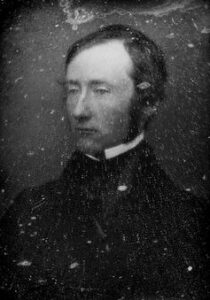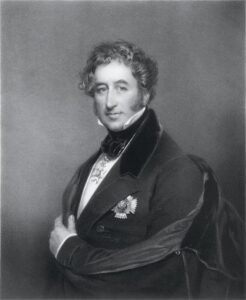Previously, I told the story of the Ecumenical Patriarchs from the outbreak of the Greek Revolution in 1821 until the resignation of the weak and ineffective Patriarch Constantius II in 1835. Today we’re picking up where we left off, and the protagonist of this story is one of the most remarkable Orthodox primates in recent history: Patriarch Gregory VI.
Whereas Constantius II was described as “an extremely mediocre and uneducated primate, one of the worst in decades, and his complete inactivity at a time when the Church was so clearly in need of leadership united all factions against him,” Gregory VI was the polar opposite: young, brilliant, and energetic. The 37-year-old Patriarch Gregory “managed to combine the zeal and energy of youth with the steadiness, maturity, and conservatism of a much older man – offering the promise of action without radical change.” According to the historian Dimitrios Stamatopoulos, “Gregorios received a patriarchal berat which offered the most power to a patriarch compared to any other figure in the history of the patriarchal institution.”
At the beginning of 1836, the new Patriarch boldly declared that he would not accept any outside interference – read, Ottoman interference – in his decisions to appoint men to positions in the Church. Gregory said that he preferred to resign as Patriarch rather than to allow outsiders to dictate appointments or removals of clergy. Rather than formally responding to this challenge, the Ottoman government attempted to transfer a bishop from one see to another. Patriarch Gregory refused to accept this. A few weeks later, the Turks demanded that another bishop be removed due to ties to the new Greek state. This time, Patriarch Gregory accepted the decision under protest, threatening that he and the entire Holy Synod would resign. On August 26, true to his word, Gregory offered his resignation – and the Ottoman government blinked, refusing to accept it and backtracking on some of its demands. Gregory had won the battle, yet additional provocations continued; for example, in October, the Ottomans tried to convince Gregory to restructure the Holy Synod to consist of the Patriarch, six bishops, and two laymen. Gregory refused.
***
Patriarch Gregory was a staunch defender of Orthodox tradition, and he made it a priority to oppose the efforts of British and American Protestants to convert the Greek Orthodox faithful. In early 1836, he issued an encyclical against Protestant missionaries, who were performing seemingly kind services to the Orthodox “with the sole object of insinuating themselves into the good will of the Orthodox and of polluting the faith of our forefathers.” The encyclical condemned the errors of the Protestant Reformers (Luther, Zwingli, Calvin, and their followers) and forbade Orthodox Christians from reading Protestant books, including Protestant versions of the Bible. In February 1837, Patriarch Gregory formed a three-man committee to combat Protestant missionary efforts in the Patriarchate, with the idea of scaling this committee model to all of the eparchies of the Patriarchate. Gregory’s anti-Protestant efforts were broadly successful. For example, a Protestant missionary in Trebizond complained that the Orthodox students at his Protestant mission school had all left him, shredding the pages of their Protestant missionary tracts and scattering them in front of the school while singing in English, “Good morning; how do you do?” Another missionary reported, “The Greek ecclesiastical committees have succeeded beyond all our anticipations, in closing all our schools, except one.”
In July of 1837, the English scholar Robert Curzon visited Constantinople and had an audience with Patriarch Gregory. Curzon carried with him a letter of introduction from the Archbishop of Canterbury. The Patriarch was unimpressed. Curzon describes the exchange as follows:
“And who,” quoth the Patriarch of Constantinople, the supreme head and primate of the Greek Church in Asia – “who is the Archbishop of Canterbury?”
“What,” said I, a little astonished at the question.
“Who,” said he, “is this Archbishop?”
“Why, the Archbishop of Canterbury.”
“Archbishop of what?” said the Patriarch.
“Canterbury,” said I.
“Oh,” said the Patriarch. “Ah! Yes! And who is he?”
Curzon, at this point in a state of confusion over the Patriarch’s apparent ignorance, tried to explain the role and importance of the Archbishop of Canterbury. The exchange continued:
“Well,” replied the Patriarch,” but how is that? How can it happen that the head of your Church is only an Archbishop? Whereas I, the Patriarch, command other patriarchs, and under them archbishops, archimandrites, and other dignitaries of the Church? How can these things be? I cannot write an answer to the letter of the Archbishop of – of –…. ’
“Of Canterbury,” said I.
“Yes! Of Canterbury; for I do not see how he who is only an archbishop can by any possibility be the head of a Christian hierarchy; …”
Patriarch Gregory was not, as Curzon thought, actually ignorant of the identity of the Archbishop of Canterbury. As the historian Jack Fairey explains, “To accept correspondence from a Protestant heresiarch would have been both personally distasteful and potentially compromising, while open rejection might offend the British embassy. Grigórios VI found an elegant solution to his dilemma by feigning ignorance.”
A year later, July of 1838, the governor of the British-controlled Ionian Islands finished drafting a new law code for the colony. As a courtesy gesture, he sent the draft to the Ecumenical Patriarchate for review. To the surprise of the British, Ecumenical Patriarch Gregory VI objected to the document, which, among other things, conflicted with canon law regarding impediments to marriage. (For example, canon law forbids marriage between second cousins, while the British draft law would have allowed it.) This opened up a conflict between the Patriarch and the British Empire that resulted in Gregory’s deposition by the Sultan a year and a half later. Instead of privately replying to the British governor, the Patriarch responded publicly: over the winter, Gregory issued two strongly-worded encyclicals condemning the British government for violating Orthodox canon law. The encyclicals attacked the British for the “subjugation of spiritual rights to political authorities” and accused them of trying to replace Orthodoxy with Protestantism. In one encyclical, directed at the Orthodox bishops in the Ionian Islands, Gregory accused the bishops of collaborating with the British authorities and urged them to repent and flee from “all modernisms and innovations in religious matters.”
Gregory’s attacks on the British leadership of the Ionian Islands continued in the spring of 1839. The Patriarch wrote letters to the Ionian Senate and to the Orthodox bishops of the islands, condemning both the draft legal code and the British interference in church affairs. He declared that the Orthodox of the islands should not send their children to Protestant schools or obey any law that conflicted with the Orthodox canons. Indeed, he proclaimed that any Orthodox Christian who was led astray by the British and did not accept correction would be excommunicated in this life and damned to hell in the next. On May 14, the British ambassador, under orders from the powerful British foreign secretary Lord Palmerston, sent a formal protest to the Ottoman government, accusing Patriarch Gregory of “improper and criminal conduct” and all but demanding that Gregory be deposed. The Ottoman authorities did not respond, prompting Palmerston to direct the British ambassador to “obtain from the Porte the removal of the Patriarch from the office which he now holds.”
***
At the beginning of 1840, police in Greece announced the discovery of a conspiracy known as the “Philorthodox Society,” which, among other things, aimed to put the Church of Greece back under the control of the Ecumenical Patriarchate. The police claimed that evidence linked Patriarch Gregory with the conspirators. Meanwhile, the British ambassador to the Ottoman Empire requested, for the second time, that the Sultan “depose the Patriarch Gregorios from the patriarchal dignity [and]… take measures capable of inducing future Patriarchs to respect the rights of independent governments.” The British threatened to make the Orthodox Church of the Ionian Islands autocephalous if Gregory remained on the throne.
The Ottoman government was in an awkward position – it had no real issues with Patriarch Gregory, but his actions were creating diplomatic problems for Turkey. For his part, Gregory told the new Ottoman foreign minister that he was prepared to accept death by hanging before he would consent to a violation of the canons. (This was no small thing to suggest – another Patriarch Gregory had been hanged by the Turks less than two decades earlier.) In January, the British ambassador once again submitted a formal request to the Ottoman government, this time asking straightforwardly that they depose Patriarch Gregory. This time, the Ottomans relented, and at the beginning of February, a formal inquiry was opened into the Patriarch’s behavior. This essentially amount to a show trial – the Ottoman Empire was trying to take a more liberal and fair approach to its religious minority subjects, so the Porte felt that it had to at least give the appearance of some kind of due process rather than arbitrarily removing Gregory from the patriarchal throne. The result of all this was that Patriarch Gregory was deposed by order of Sultan Abdulmecid on March 3. The following day, Metropolitan Anthimus of Nicomedia was elected Patriarch, in a clear concession to the Russians, as the new Patriarch Anthimus IV was known to be pro-Russian as well as a personal friend of his predecessor Gregory.
***
At the time he was deposed, Gregory VI was just 42 years old, and he was basically the elephant in the room in every patriarchal election for the next quarter-century. As we’ll see in future articles, every few years, the Ecumenical Patriarch would be deposed, and at every new election, people hoped that Gregory VI could return to the throne. But because he was so independent and hard to control, Gregory’s candidacy was persistently opposed by the Ottoman authorities (under heavy influence from the British embassy). Finally, in 1867 — at the age of 69 — Gregory was re-elected Patriarch, just in time to have to deal with the “Bulgarian schism.” But that is a story for another day.
Main Sources
This article would not have been possible without the outstanding scholarship of Jack Fairey, who wrote the must-read book The Great Powers and Orthodox Christendom: The Crisis over the Eastern Church in the Era of the Crimean War and the equally valuable paper “‘Discord and Confusion… under the Pretext of Religion’: European Diplomacy and the Limits of Orthodox Ecclesiastical Authority in the Eastern Mediterranean” (The International History Review 34:1 (March 2012), 19-44), which covers the fight between Patriarch Gregory and the British Empire. Other valuable sources include the following:
Χαμχούγιας, Χρήστος (2006, Αριστοτέλειο Πανεπιστήμιο Θεσσαλονίκης (ΑΠΘ)), Ο Οικουμενικός Πατριάρχης Κωνσταντινουπόλεως Γρηγόριος ΣΤ’ ο Φουρτουνιάδης εν μέσω εθνικών και εθνοφυλετικών ανταγωνισμών
Lora Gerd, Russian Policy in the Orthodox East: The Patriarchate of Constantinople (1878-1914) (De Gruyter Open, 2014).
Dimitrios Stamatopoulos, “Orthodox Ecumenicity and the Bulgarian Schism,” in Etudes Balkaniques LI/1: Greece, Bulgaria and European Challenges in the Balkans (Sofia: Institut d’Etudes balkaniques & Centre de Threcologie, 2015), 70-86.


I always understood it to be “First AMONG Equals.”
I always find it amusing you have to throw in a tid bit about the Russians (your controllers) in every pseudo article.
Man, I’m not controlled by anyone. Orthodoxy cannot be reduced to a false EP/Moscow dichotomy.
I try very hard to be as balanced and accurate as I possibly can. If I’ve said something wrong, please point it out. But the fact is that the Russian church and state are highly relevant to the story of the EP in the 19th century.